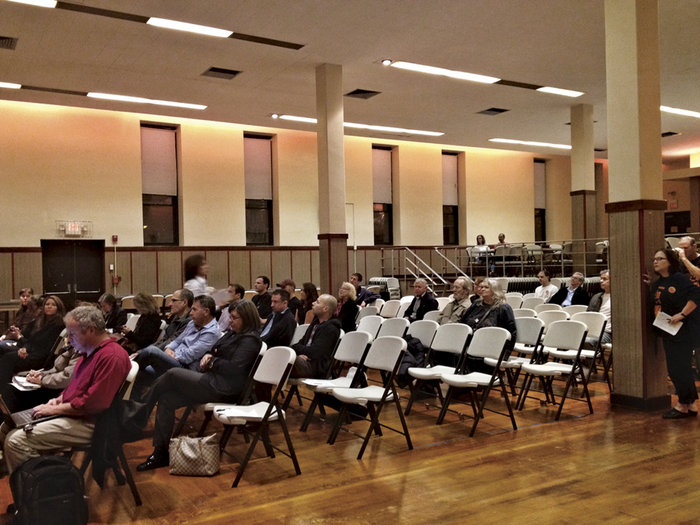A forum held Wednesday at Our Lady of Grace School on Ballot Question No. 2 regarding rent control allowed the Hoboken Fair Housing Association (HFHA) and the Mile Square Tax Payers Association (MSTA) to argue their sides of the issue and answer audience questions. The event was co-sponsored by the Hoboken Quality of Life Coalition, Inc. and The Parish of Our Lady of Grace and St Joseph.
Susan Lisovicz, long-time CNN correspondent who is also a Hudson County resident, acted as moderator.
The ballot question, which survived a recent legal challenge, enables landlords to remove units from rent control once the current tenant voluntarily vacates or is evicted. Condominiums and buildings with one to four units will not have to return to rent control. In buildings with four or more units, the new tenant will return to a controlled rent once a new market rate rent is negotiated for that unit.
Aside from the wording of the ballot question, which has been a hot topic for weeks, there are two very different sides to this story.
There wasn’t much the two sides agreed on, and the audience was divided as well.
“The term affordable housing means housing that people can afford.” – Matt Shapiro
____________
Around 60 attendees offered back and forth commentary throughout the debate.
Tenant advocate Cheryl Fallick and activist Mary Ondrejka confronted the moderator, saying that the questions were distributed unjustly, following seven back-to-back MSTA questions.
The main issue
Hoboken Fair Housing Association is concerned that the new measure, if passed, will encourage landlords to pressure tenants into leaving their homes. HFHA speaker Dan Tumpson reiterated this point throughout the night. This is a fear that even MSTA speaker Ron Simonini called “understandable.”
The fear is predicated on the idea that landlords might bully their tenants, motivated by the prospect of higher rents. Bullying can range from threats to “soft bullying” like reduction of services.
“The only way they can get these increases,” said HFHA speaker Matt Shapiro, “is if these tenants leave. They will have the motivation [to bully]. Or landlords will make their tenants lives unhappy enough that the tenants will leave on their own.”
Simoncini and Gormally explained the current protections tenants have under the eviction laws in the state of New Jersey.
Simoncini also said if tenants were being harassed, New Jersey would have seen harassment cases involving landlords, since Hoboken is one of the last standing cities to exercise rent control.
“There would be one [landlord harassment case], we would have heard of at least one,” Simoncini said.
Shapiro waved a newspaper that offered a Bayonne story of tenants moving out due to building rehab work. “These people were forced out by dust balls,” said Shapiro. “There are four people left in a 20 unit building. Did they file harassment? No.”
“No landlord is going to risk going to jail for five years,” countered Simonicini.
Keeping up with the Jones’s
There are two main reasons property owners cite for this change to rent control. One reason is that rent controlled units would depress a landlord’s income at the same time an impending property revaluation could cost them higher property taxes.
The other reason is because landlords say they cannot afford upkeep or upgrades on the building(s) they own if they are getting a limited income, leaving them uncompetitive with newer developments in town.
HFHA and tenant advocates counter that the disruption of rehab and renovation work on a building could be enough to force a tenant want to leave. They said landlords can claim a substantial financial hardship that would make rehabilitating their properties more affordable.
“Landlords need incentives to invest [in their buildings],” Simoncini said. “I have never heard anyone say stop improving the property. This change would be gradual and allow owners to take the time to renovate when a tenant vacates.”
HFHA speakers said that Hoboken is not like any other rental market and should not be treated as other markets have been.
“[Hoboken] is an extraordinary market due to the proximity to New York,” said Shapiro. “It’s not like any other city.”
Though Hoboken has ordinances in place to insure that affordable housing units are constantly being allotted or funded, HFHA fears that affordable housing will be lost if rent control is removed. MSTA argued that affordable housing and rent-control are not correlated.
“Rent control has nothing to do with affordable housing. It is a consumer protection,” said Simoncini.
Still, HFHA felt that people may not qualify for subsidized or Section 8 housing, but may also not be able to afford market rent and would have to leave town, if they got bullied from their current homes.
“The term ‘affordable housing’ means housing that people can afford,” said Shapiro.
Amanda Palasciano may be reached at amandap@hudsonreporter.com.
